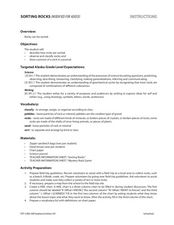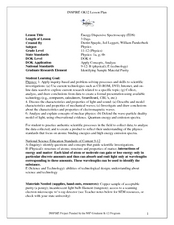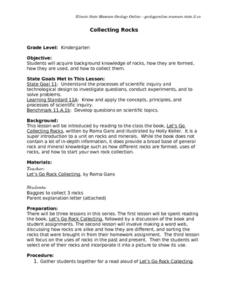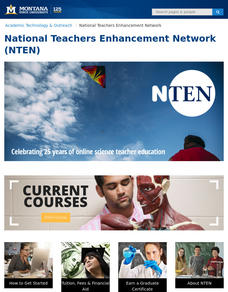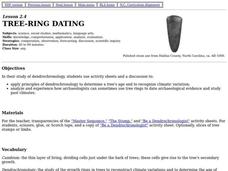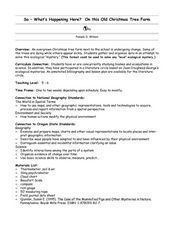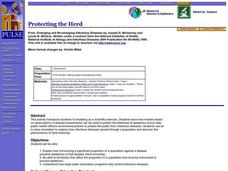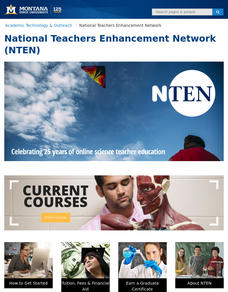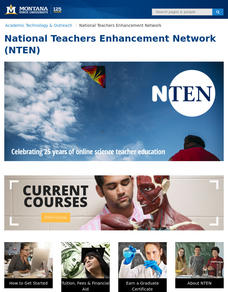Curated OER
Weather is Cool, Hot or Somewhere In-Between
Students access the Internet to record data on weather. They use email to answer a younger classes' questions about the weather.
Curated OER
Sorting Rocks
Students develop a rock word web during a large group discussion. Using the categories generated during that discussion, they sort their rock samples accordingly.
Curated OER
Energy Dispersive Spectroscopy
Students calculate the values of electron binding energies. In this physics instructional activity, students solve for different wavelength characteristics of X-rays. They present their findings to the class.
Curated OER
Automated Vehicle Programming Design
Students design a program to make an automated vehicle perform a specific task. In this robotics lesson, students play the role of scientists competing to win a factory's contract. They present their algorithm to class.
Curated OER
2D Kinematics w/ String Racers
Students calculate the speed of string racers. In this physics lesson plan, students measure the time in several trials and get the average. They graph their results using a spreadsheet.
Curated OER
I Need Room to Breathe
Seventh graders explore how exercise affects carbon dioxide levels in exhaled air.
Curated OER
Numerical Determination of Drag Coefficients
Students create a video of an object falling with a drag. In this physics instructional activity, students calculate drag coefficient using data from Logger Pro. They calculate velocity and acceleration of the object.
Curated OER
Movement, it's FUN-damental!
High schoolers discover how muscles work. For this biology lesson, students explain the causes of fatigue and muscle soreness. They create graphs and compare results with their classmate.
Curated OER
Collecting Rocks
Students investigate how rocks are formed, how they are used, and how to collect them by listening to a read aloud of Roma Gans, Let's Go Collecting Rocks.. They discover background knowledge of rocks.
Curated OER
Geologic Time: Relative and Absolute Dating
High schoolers investigate relative and absolute dating; determine the difference between the two dating systems; and apply this knowledge by creating a geologic timetable of their own.
Curated OER
Human Evolution
High schoolers make and use observations of Laetoli footprints to provide clues to life in the past. They collect and analyze data to study the relationship between foot length and body height.
Curated OER
The Effect of Moisture on Soil Temperature
Young scholars analyze the relationship between soil moisture and its effect on soil temperature.
Curated OER
From Genomes of Species
High schoolers investigate genomic research being done and its potential for understanding, treating, and possibly curing human genetic conditions. The potential of proteomic research as a companion to the work being done with genomics...
Curated OER
Tree-ring Dating
Students complete activity sheets and participate in discussions while they study dendrochronology. They determine a tree's age and recognize how the climate varied over time.
Curated OER
So -- What's Happening Here? On this Old Christmas Tree Farm
Young scholars take a field trip to an old Christmas tree farm near their school. In groups, they gather data at the site and analyze the data in an attempt to discover what happened to the area. They identify human activities that led...
Curated OER
Wh0-o-o-o's Out There?
Fifth graders describe the physical features of an owl and identify survival adaptations. They Investigate an owl's niche in an ecosystem. The students participate in an interactive puzzle on the internet that helps for motivation.
Curated OER
Protecting the Herd
Students explain how immunizing a significant proportion of a population against a disease prevents epidemics of the disease (herd immunity). They list factors that affect the proportion of a population that must be immunized to prevent...
Curated OER
CURRENT AND CLIMATE
Learners study currents and how they have been used to plot courses for travel. They examine the ocean currents in both the Atlantic and Pacific and discuss their effect on local weather.
Curated OER
Do Human Practices Affect Water Quality?
Learners determine if human practices have any noticeable effects on the quality of stream life as measured by the presence of certain macroinvertebrates. They collect, preserve and identify macroinvertibrate samples and quantify the data.
Curated OER
Predicting Monthly Precipitation
Students should log onto, and collect data from, a specific site on the Internet. They average and compare the data using the Excel spreadsheet program, make predictions from their data, and determine the percent error of their predictions.
Curated OER
Introduction to Ecology
Eighth graders identify the living and nonliving components of an ecosystem. In this ecology lesson, 8th graders explain the role each organism plays. They participate in class discussion and answer a quiz at the end of the lesson.
Curated OER
I Have the Solution!
Students explain how to make solutions with specific concentration. In this chemistry lesson, students differentiate acids and bases. They calculate molarity of solutions.
Curated OER
Yeast Cells and Their Environment
Middle schoolers create their own experiment in which they have yeast cells growing in liquid environments. They examine the relationship between humans and microorganisms. They also practice using the scientific method.
Curated OER
Examining Infiltration Rates of Various Soil Types
Students formulate their own hypothesis, determine which variables are important to test their hypothesis, design an experiment in which they collect data. They utilize instruments and tools to measure, calculate, and organize data.



